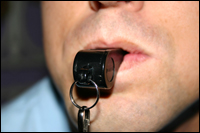
Last week, when a House of Representatives committee approved new whistle-blower protection legislation, the Bush administration flew into a tizzy, saying such protections would open the door to gratuitous complaints against its officials and create needless headaches.
But the House committee held strong, citing more than a dozen plights like that of Teresa Chambers as evidence that one too many federal employees have had their whistles — and their jobs — confiscated. Chambers got the boot from her post as chief of the U.S. Park Police after she told the press that her agency didn’t have adequate funding or personnel to keep parks and monuments in Washington, D.C., safe.
Chambers isn’t the only employee working on national parks or environmental issues who has been silenced since President Bush took office. In the past four years, the Department of Interior and U.S. EPA have both been widely criticized by insiders and the media for preventing their employees from talking to the press.
The latest developments — coming just weeks before Election Day — have the EPA slapping a muzzle on agency staffers in both the Midwest and Rocky Mountain regions, directing them to refer all media requests to senior public-relations officials.
In early September, Bharat Mathur, the head honcho for EPA Region 5 (which includes Illinois, Indiana, Michigan, Minnesota, Ohio, and Wisconsin — more than a few key swing states), sent a memo to all regional staff entitled “Working With the Press.” “I want to ensure that the Region puts its best face forward [and] that we speak with a consistent voice,” wrote Mathur, sounding eerily big-brotherish. He ordered employees to “refrain from answering [press] inquiries directly,” explaining that this “will prevent EPA management from being surprised by news coverage.”
As it so happens, the EPA chieftains had been unpleasantly “surprised” by news a few weeks previous, when the press got wind of EPA scientist Peter Howe‘s objections to a plan for a new $2.1 billion coal-fired power plant in Wisconsin and his call for the EPA to intervene. Howe was reprimanded and suspended for two weeks for allowing his opinions to get out into the public sphere. Jeff Ruch of the watchdog group Public Employees for Environmental Responsibility says the Mathur memo was a “paranoid overreaction” to the Howe controversy.
Soon thereafter, Washington trade publication Inside EPA got ahold of an email from an official in EPA Region 8, which encompasses a number of Rocky Mountain states, issuing a similar directive. “[S]ince it is two months before election day there are likely to be plenty more [press inquiries on environmental matters],” wrote the official. “[H]ere is how to handle inquiries for information that seem partisan: ‘NO COMMENT.’ Refer the caller to [press representatives]. Call [the reps] as soon as you hang up the phone to let them know about the call. … I want Region 8 and all of us as employees to stay squeaky clean regarding even a suggestion of Hatch Act inappropriate activities.” (The Hatch Act spells out prohibited election-related activities for people on the government payroll.)
Inside EPA reported that the Region 8 edict was directly connected to the Senate race in Colorado between Democrat Ken Salazar and Republican Peter Coors — a tight contest featuring controversial figures with strong and opposing opinions on the environment. The Region 8 email also warned employees to steer clear of commenting on the “Lowry landfill,” a Superfund site with groundwater contamination that has been held up as a bad example by those who accuse the Bush administration of dropping the ball on toxic-site cleanups.
EPA press secretary Cynthia Bergman failed to return Muckraker’s calls and answer questions about whether these memos reflect national policy or were encouraged by D.C. headquarters.
Former EPA employee Sylvia Lowrance, who worked at the agency for more than two decades, called the EPA media paranoia unprecedented. “Of course the EPA has always been cautious about media, but never have I seen memos that put so much emphasis on clearing queries with ‘senior officials.’ It’s a much more top-down approach to communications than I’ve seen in the past.” Even more peculiar, she said, is the timing. “These are the sorts of protocol memos that are supposed to be released at the beginning of an administration, not at the tail end of the term.”

